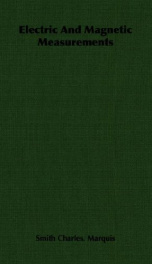electric and magnetic measurements

Text extracted from opening pages of book: ELECTRIC AND MAGNETIC MEASUREMENTS BY CHARLES MARQUIS SMITH ASSOCIATE PROFESSOR OF PHYSICS PURDUE UNIVERSITY THE MACMILLAN COMPANY 1919 All rights reserved COPYBJGHT, 1917, BY THE MACMILLAN COMPANY. Set up and clectrotyped. Published February, 1917. Nocinooti J. 8. Gushing-Co. Berwick & Smith Co. Norwood, Mass., U. S. A. ELECTRIC AND MAGNETIC MEASUREMENTS INTRODUCTION PART I. LABORATORY METHODS 1. Treatment of Errors in Laboratory Work. In everyday life it is not uncommon to bear positive statements as to the accuracy of frequently measured magnitudes, such as mass or length, although every one knows that instruments of increased precision would show more or less important deviations from the stated values. In accurate scientific work, the ideal is to make measurements which shall be without error. This ideal is not attainable, however, and the methods chosen, as well as the values observed, must be studied carefully in order to determine the most probable value of the quantity which ia being measured. In every measurement attention must be paid to all the conditions which may affect the correctness of the value sought, and an estimate must be made, of the reliabil ity, or probable precision, or trustworthiness, of the final result. ' Let us suppose that a galvanometer deflection . of 8.55 cm. is observed, and let us assume that a careful estimate of the probable precision of the measurements leads to the conclusion that the observer can be sure of a single reading to within 0.02 cm. The deflection will be recorded in the form d = 8.65 0.02 cm., B 1 2 INTRODUCTION [ 2 which means that the recorded result will not be in error by more than 0.23%. Errors of various kinds arise in making measurements, the most important of which are the following : Errors of observation, due to lack of ability on the part of the observer to make accurate readings. Simple mistakes, which grow less troublesome as the observer gains in training and experience. Instrumental errors, due to incorrect calibration of scales or to faulty adjustment of comparison standards. Systematic errors, due to defects in the method used. It is readily seen that the effect of errors of observation is reduced by taking the average of a great many measurements, in which the chance that some readings are too large is offset by the chance that others are too small. Apparatus of a higher grade, more carefully made and calibrated, is important for the elimination of instrumental errors, while repeating the experi ment by independent methods reduces the systematic errors. 2. Laboratory Methods. In order to accomplish results in the laboratory it is of fundamental importance first to under stand thoroughly what is to be done, and then to proceed in a systematic manner to do it. In general, formulas and circuit diagrams should not be memorized, but instead they should be reproduced as the result of, careful study and logical thought. The student should be able, before performing the experiment, to derive the formulas and to draw the circuits. This should be the outcome of a thorough understanding of the argument of the problem, however, rather than definite acts of memory. The following points should be carefully observed : ( 1) Make sure that you know fully the purpose and the theory of the experiment, including the meaning of all the leading terms. 2] LABORATORY METHODS 3 ( 2) Be sure that you know precisely what data are to be secured. ( 3) Prepare in advance a schedule or program according to which the observations will be taken, and make a ruled table with headings for the record. This makes it unlikely that any step will be omitted, and furnishes a check that the necessary data are in hand. ( 4) Secure a laboratory notebook or observation journal of a convenient size, preferably permanently bound, and keep it exclusively for this course, dating each set of entries. ( 5) Frequently in engineering practice, one person takes the obs
Info about the book
Author:
Series:
Unknown
ISBN:
0442278411
Rating:
3.5/5 (3)Your rating:
0/5
Languge:
English
Users who have this book
Users who want this book
What readers are saying
What do you think? Write your own comment on this book!
write a commentGenre
if you like electric and magnetic measurements try:
Other books by this author
Do you want to read a book that interests you? It’s EASY!
Create an account and send a request for reading to other users on the Webpage of the book!


